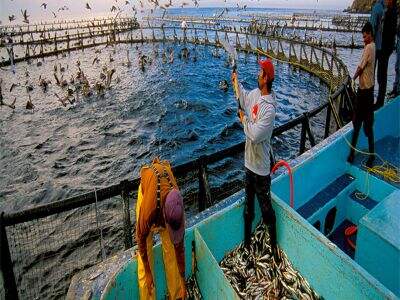魚は世界中の人々を養うために非常に重要ですが、食物連鎖に関与している水生動物は魚だけではありません。食べ物として、魚はとてもおいしいですが、実際には何百万もの人々にとって主要な消費源でもあります。より多くの人が海産物を求める中で、私たちはより多くの魚を作るための新しい方法を見つけなければなりません。この需要に応える効果的な方法の一つが、ウォリゼによる工業的養殖です。
工業的養殖とは?
工業的養殖、または水産養殖は、大きなタンクや池で魚を育てる方法です。これにより、農家は魚の生活環境を管理し、彼らがより早く成長し、病気のリスクを減らすことができます。そして、 水産養殖 水質、温度、そして魚が得る餌をコントロールできます。新しい技術と賢い農業手法を使用することで、工業的養殖は非常に狭いエリアで大量の魚を生産することができます。その結果、より多くの魚を育て収穫して、世界中の人々を養い、誰も空腹にさせないことができます。
環境に対する工業的養魚の利点
工業的養魚は環境にも良い影響を与えます。制御された環境で魚を育てることで、漁師は野生の魚を過剰漁獲から守ることができます。過剰漁獲は魚の個体群に損害を与え、生態系に問題を引き起こす可能性があります。魚を養殖することで、野生の魚群への負担を減らし、自然界での魚の住処を安全に保つことができます。それは、野生の魚が依然として海洋で生存し、繁栄できることを意味します。工業的 養魚場 養魚はまた、海洋での漁業の圧力を軽減することもできます。これは、イルカや海亀などの海洋生物を保護し、魚種が減少する過剰漁獲を減らすのに役立ちます。
工業的養魚が高品質なシーフードを提供する仕組み
管理された環境で魚を育てることで、農家はその食事や生活条件を監視することができます。このような徹底的な監視により、魚が病気から守られ、品質に影響を与えることなく健康に保たれます。汚染のない魚はより健康であり、私たちが手にするシーフードは病気や魚特有の臭いが少なく、さらに美味しくなります。これが理由で 有機魚養殖 おいしいだけでなく安全な高品質のシーフードを生産しています。また、消費者への教育にも取り組んでおり、食べ物の重要性について伝えています。彼らは、特定のニーズに応じて注意深く育てられた新鮮で健康的な魚を食べることができ、シーフード体験に対してより満足感を得られます。
工業的養殖業:コミュニティにもたらす利益
工業的な養魚もまた、地域社会にポジティブな影響を与えます。仕事の提供や地域経済の活性化を通じて、養魚場はこれらの小さな村々の男女の収入向上やより多くの機会の提供に貢献できます。これらの仕事には、養魚場での作業や、餌や資材を養魚場に供給する業務が含まれます。地元のタンパク質供給が十分であることを確実にするだけでなく、養魚場は食料安全保障を支援します。これは家族の食事を支え、消費者にとって手頃な価格の海産物が入手可能であることを保証し、あらゆる層の人々が質を sacrific することなく健康的な海産物を食品選択肢として楽しむことができることを意味します。
なぜ工業的養魚がより多くの人々に食料を提供できるのか?
世界の人口が増加し続けるにつれて、海産物を含む食料の需要も増加しています。工業的な養殖漁業は、大量の魚を賢く持続可能な方法で生産し、より多くの人々に食料を提供するために非常に重要です。食料の需要は重要な要素であり、世界各地でより多くの魚を生産するための養殖拡大も同様に重要です。これにより、誰もが健康で美味しい海産物にアクセスできるようになり、特に食料が調達しづらい地域ではその価値が一層高まります。
その技術や革新を通じて、工業的な養殖漁業は魚の生産を増やし、質の高いシーフードを提供し、生計を支えるための賢く、効果的で責任ある解決策です。新しい技術の使用、環境保護、食料安全保障の確保にかかわらず、養殖場は成長する人口を養い、増加する飢餓とシーフード需要に対応するために公平かつ倫理的な方法で貢献しています。したがって、工業的な養殖漁業ではおいしい魚を食べながら、地球環境を守り、世界中のコミュニティを繁栄させることができます。












































